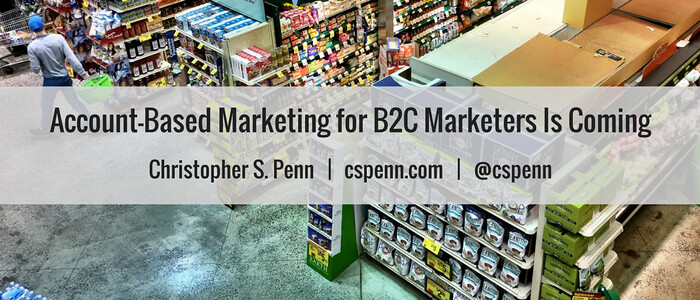Account-based marketing (ABM), or target account marketing, has been the darling of B2B marketers for a few years. With advances in technology, it’s poised to become a powerful force in B2C marketing as well.
An ABM Primer
For those unfamiliar, ABM is a marketing method in which we target only those companies and buyers who represent our ideal, best customers. If we sell, for example, an enterprise server appliance, we would target only companies with the budget and need for such an appliance. We wouldn’t attempt to sell to a small business, because they would have neither budget nor need.
ABM leverages technologies such as retargeting, remarketing, custom audiences, and data enrichment to help narrow down who our audience is, then market to those audiences using predominantly digital methods. ABM uses the same technologies as regular digital marketing, but instead of spending large budgets reaching everyone, it spends more responsibly on just the likely buyers. When executed well, ABM creates higher quality leads for sales professionals to close.
Two reasons explain why ABM has largely been the domain of B2B marketers. First, ABM software tends to be on the expensive side, costing hundreds or thousands of dollars a month on top of existing marketing technology stacks. The nature of B2B sales is typically that a few sales will more than make up for the cost of such a system at the enterprise level.
Second, ABM software also requires extensive information about our target market. ABM software needs lots of contact information to optimize its marketing methods, from names to titles to email and mobile numbers.
ABM for B2C
What has changed to suggest that ABM might be impactful for B2C marketers? First, dispose of the notion of B2B vs. B2C marketers. What truly matters is the complexity of the sale.
B2C sales are becoming more complex due to mobile technology. What were formerly straightforward transactions in the past now have longer, more complex sales cycles. Consider the purchase of a new laptop computer. In the past, we might have gone to the local big box electronics store, browsed the shelves, asked a sales representative for some help, and bought a computer.
Today, the sale is far more complex as consumers check reviews, read product ratings, ask friends and family on social media, watch videos, and more. The number of touch points before the sale has dramatically increased, and ABM technology is well-suited to helping retailers be present at the many different touch points of the modern sale.
Second, B2C sales data is far more available and will become even more available as time goes on. We live in a data-rich marketing environment in which consumers are continually volunteering more and more information. Our smartphones track our every move, our home assistants listen to every conversation. Cross-device tracking is becoming more powerful and useful. Consumer data is richer than ever; thanks to mobile phone IDs, we’re now able to target individuals with the same precision by phone as by email. Retargeting and remarketing capabilities are open to businesses of any size.
ABM works only when we are able to identify our ideal target customers. With the abundance of consumer data available and relatively inexpensive, any complex sale will benefit from ABM technology and methods.
Which B2C Companies Will Benefit Most from ABM?
Any complex sale will benefit from ABM, whether B2B or B2C. In the consumer realm, big ticket purchases tend to be complex sales:
- Cars
- Real estate
- Computers and electronics
- Financial services
- Higher education
- Furniture and home decor
- Renovation/construction
Essentially, if your industry requires a salesperson, your industry may benefit from ABM. Consider looking into ABM software for your sales and marketing if you fit the category of a complex sale.
You might also enjoy:
- Almost Timely News, Febuary 18, 2024: From Comment to Content
- You Ask, I Answer: Legality of Works in Custom GPTs?
- Almost Timely News, January 28, 2024: Copyright Must NEVER Apply to AI-Made Works
- You Ask, I Answer: AI Music Collaborations and Copyright?
- Mind Readings: Most Analytics Data is Wasted
Want to read more like this from Christopher Penn? Get updates here:
 Take my Generative AI for Marketers course! |



Leave a Reply